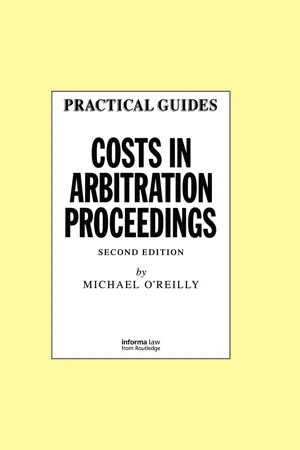
- 218 pages
- English
- ePUB (mobile friendly)
- Available on iOS & Android
Costs in Arbitration Proceedings
About this book
This revised text provides a practical guide to the law relating to all aspects of costs in arbitration proceedings. The Arbitration Act 1996, has made significant changes to the law on arbitration costs. These have, among other things, made arbitrators responsible for the cost-effective management of cases, and given them new powers to help them achieve this. In its second edition, "Costs in Arbitration Proceedings" has been updated to include sections on: agreements as to costs; the arbitrator's power to limit costs; and forms and precedents. It sets out the law of costs for the parties and of the parties, the arbitrators' fees, taxation of costs, and security for costs, costs implications of offers of settlement and application to the court in repect of costs. It is suitable for professional arbitration lawyers and also for the new or lay arbitrator.
Frequently asked questions
- Essential is ideal for learners and professionals who enjoy exploring a wide range of subjects. Access the Essential Library with 800,000+ trusted titles and best-sellers across business, personal growth, and the humanities. Includes unlimited reading time and Standard Read Aloud voice.
- Complete: Perfect for advanced learners and researchers needing full, unrestricted access. Unlock 1.4M+ books across hundreds of subjects, including academic and specialized titles. The Complete Plan also includes advanced features like Premium Read Aloud and Research Assistant.
Please note we cannot support devices running on iOS 13 and Android 7 or earlier. Learn more about using the app.
Information
CHAPTER 1
INTRODUCTION TO COSTS IN ARBITRATION PROCEEDINGS
1.1 THE STATUTORY REGIME
1.2 THE COSTS OF THE ARBITRATION
1.2.1 The costs of the arbitration and the recoverable costs
1.2.2 Liability for recoverable costs
1.3 THE APPLICABILITY OF THE ENGLISH LAW OF COSTS IN ARBITRATION
1.4 THE COSTS PROVISIONS OF THE ARBITRATION ACT 1996
Table of contents
- Cover
- Half Title
- Title Page
- Copyright Page
- Preface
- Table of Contents
- Table of Cases
- Table of Legislation
- Chapter 1 Introduction to Costs in Arbitration Proceedings
- Chapter 2 The Arbitrator’s Fees and Expenses
- Chapter 3 The Award as to Liability for Costs
- Chapter 4 Orders and Awards as to Costs: Practical Considerations
- Chapter 5 Determining the Recoverable Costs of the Arbitration
- Chapter 6 Security for the Costs of the Arbitration
- Chapter 7 Offers of Settlement: Costs Protection
- Chapter 8 Limitation of Recoverable Costs
- Chapter 9 Applications to the Court in Respect of Costs
- Appendices
- Index